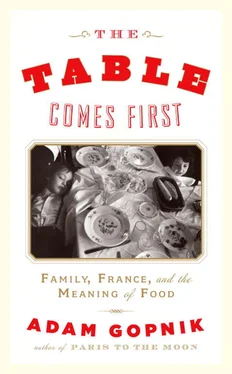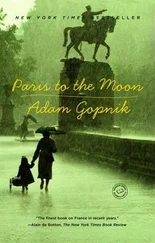On larger, more ultimate if moony questions of What It All Means for Man, I learned from James E. McWilliams’s A Revolution in Eating: How the Quest for Food Shaped America (New York: Columbia University Press, 2005), Richard Wrangham’s Catching Fire: How Cooking Made Us Human (New York: Basic Books, 2009), and Tom Standage’s An Edible History of Humanity (New York: Walker, 2009). The great Canadian scholar Margaret Visser’s many writings on the rituals of eating are essential, too, though for some reason I haven’t found the occasion to quote them nearly as often as I read them. Inspiring studies in the anthropology of the table, I’d be glad if some subtle shared Canadian hue colors every one of these pages. I’d particularly single out her The Rituals of Dinner: The Origins, Evolution, Eccentricities, and Meaning of Table Manners (New York: Penguin, 1992). A. J. Liebling’s Between Meals remains the model. It seems only right, and fit, that I first encountered Jacques Decour, and his last letter, in Liebling’s great, now overlooked anthology of French Resistance writing, The Republic of Silence (New York: Harcourt Brace and Company, 1947).
Darra Goldstein’s extraordinary journal Gastronomica has become a constant resource for anyone concerned with the higher history of the higher (and lower) cooking; I’m happy and proud to say that the chapter on the problem of taste, and its history, in this book began life as the keynote lecture at a symposium at Williams College on the occasion of Gastronomica ’s tenth birthday.
And in addition to the dedicatees, especial thanks to the cooks who have illuminated my life, and made me always aware that beneath all conversation and arguments are the plain facts of the kitchen, and among them most of all Peter Hoffman, Dan Barber, and Ruthie Rogers. My thanks to my first family, the original table, Mom Myrna, Dad Irwin, Alison, Morgan, Blake, Hilary, Melissa; I still set a table for eight in my mind. (In memoriam: Eugenio Donato.) And to George Andreou, who composed the menu, and Henry Finder, who tasted all the plats. And thanks, too, to Lydia Buechler at Knopf, and to my indispensable and alarmingly brilliant trio of assistant- apprentices who have occupied the lion’s chair in the hallway while this book was being written—who dug out books, made lists, and read chapters and, for this one, actually tested recipes: Rebecca Cooper, Madeline Schwartz, and, especially, Ariel Knutson.
Grateful acknowledgment is made to Random House, Inc., and The Wylie Agency LLC for permission to reprint an excerpt from “Grub First, Then Ethics” (previously titled “On Installing an American Kitchen in Lower Austria,” copyright © 1958 by Edward Mendelson, William Meredith and Monroe K. Spears, Executors of the Estate of W. H. Auden, from Collected Poems of W. H. Auden by W. H. Auden.
Photograph of Elizabeth Pennell © Victoria and Albert Museum, London.
Adam Gopnik has been writing for The New Yorker since 1986. He is a three-time winner of the National Magazine Award for Essays and Criticism and the George Polk Award for Magazine Reporting. He lives in New York City with his wife and their two children.
The Steps Across the Water
Angels and Ages: A Short Book about Darwin, Lincoln, and Modern Life
Through the Children’s Gate
Paris to the Moon
The King in the Window
Americans in Paris: A Literary Anthology (editor)
High and Low: Modern Art and Popular Culture (with Kirk Varnedoe)
THIS IS A BORZOI BOOK
PUBLISHED BY ALFRED A. KNOPF AND ALFRED A. KNOPF CANADA
Copyright © 2011 by Adam Gopnik
All rights reserved. Published in the United States by Alfred A. Knopf, a division of Random House, Inc., New York, and in Canada by Alfred A. Knopf Canada, a division of Random House of Canada Limited, Toronto.
www.aaknopf.com, www.randomhouse.ca
Knopf, Borzoi Books, and the colophon are registered trademarks of Random House, Inc.
Knopf Canada and the colophon are trademarks.
Portions of this work were previously published in different form in The New Yorker . Permission to reprint previously published material can be found following the acknowledgments.
Library of Congress Cataloging-in-Publication Data
Gopnik, Adam
The table comes first : family, France, and the meaning of food / Adam Gopnik.–1st ed.
p. cm.
eISBN: 978-0-307-70059-9
1. Food–Social aspects. 2. Dinners and dining. 3. Food habits–France. I. Title.
GT2850.G67 2011
394.1′20944–dc23 2011013564
Library and Archives Canada Cataloguing in Publication
Gopnik, Adam
The table comes first : family, France and the meaning of food / Adam Gopnik.
1. Gopnik, Adam. 2. Food. 3. Food habits. 4. Food—Social aspects. 5. Food habits—Social aspects. I. Title.
GT2850.G67 2012 394.1′2 C2011-902638-4
Jacket photograph by Richard Kalvar/Magnum Photos
Jacket design by Barbara de Wilde
v3.1












